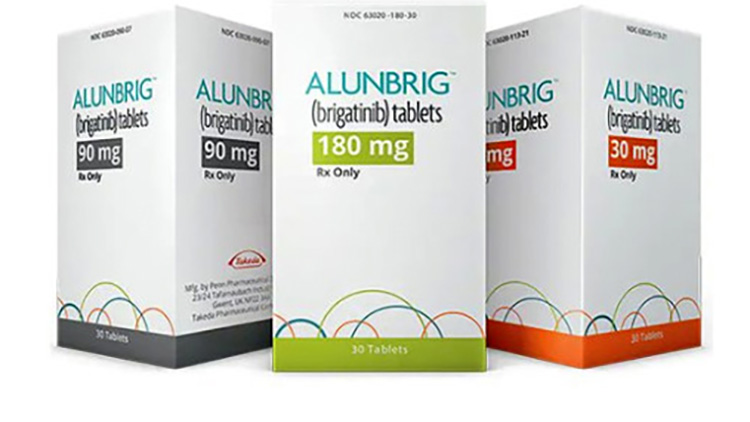Keytruda (pembrolizumab) vs Alunbrig (brigatinib)
Keytruda (pembrolizumab) vs Alunbrig (brigatinib)
Keytruda (pembrolizumab) is an immunotherapy drug that works by blocking the PD-1 pathway, which helps the immune system to detect and fight cancer cells, and is commonly used to treat various types of cancers, including melanoma, lung cancer, and head and neck cancer. Alunbrig (brigatinib), on the other hand, is a targeted therapy that specifically inhibits ALK, a protein that can be involved in the development of non-small cell lung cancer, and is used in patients who have an abnormal ALK gene. When deciding between Keytruda and Alunbrig, it is crucial to consider the specific type of cancer, the presence of certain genetic mutations, and the overall health profile of the patient, as these factors will determine which medication is the most appropriate.
Difference between Keytruda and Alunbrig
| Metric | Keytruda (pembrolizumab) | Alunbrig (brigatinib) |
|---|---|---|
| Generic name | Pembrolizumab | Brigatinib |
| Indications | Various types of cancers including melanoma, lung cancer, head and neck cancer, Hodgkin lymphoma, and others. | Non-small cell lung cancer (NSCLC) with ALK mutations. |
| Mechanism of action | Programmed death receptor-1 (PD-1) blocking antibody. | Anaplastic lymphoma kinase (ALK) inhibitor. |
| Brand names | Keytruda | Alunbrig |
| Administrative route | Injection (IV) | Oral |
| Side effects | Fatigue, musculoskeletal pain, decreased appetite, pruritus, diarrhea, nausea, rash, fever, cough, dyspnea, constipation, pain, and abdominal pain. | Nausea, diarrhea, fatigue, cough, headache, pneumonia, abdominal pain, rash, hypertension, myalgia, and visual disturbances. |
| Contraindications | None specifically listed; use with caution in patients with a history of severe immune-mediated adverse reactions. | None specifically listed; however, caution is advised in patients with history of pancreatitis, pulmonary toxicity, and hypertension. |
| Drug class | Anti-PD-1 monoclonal antibody | Tyrosine kinase inhibitor |
| Manufacturer | Merck & Co. | Takeda Pharmaceutical Company |
Efficacy
Keytruda (Pembrolizumab) Efficacy in Lung Cancer
Keytruda, known generically as pembrolizumab, is a highly effective immunotherapy drug used in the treatment of various forms of lung cancer. It is a type of monoclonal antibody that works by targeting the programmed death receptor-1 (PD-1) pathway, which is exploited by cancer cells to evade the immune system. In non-small cell lung cancer (NSCLC), Keytruda has shown significant efficacy, particularly in patients whose tumors express PD-L1 with a proportion score of 1% or more. Clinical trials have demonstrated improved overall survival and progression-free survival in patients treated with Keytruda compared to chemotherapy alone.
For small cell lung cancer (SCLC), Keytruda has also been evaluated and has shown benefits in terms of response rate and durability of response. It is often used in the extensive-stage SCLC after the disease has progressed on other therapies. The efficacy of Keytruda in lung cancer has led to its approval as a first-line treatment option for certain patients with NSCLC and as part of combination therapy for SCLC, marking a significant advancement in the management of these challenging forms of cancer.
Alunbrig (Brigatinib) Efficacy in Lung Cancer
Alunbrig, or brigatinib, is a targeted therapy approved for the treatment of NSCLC in patients with anaplastic lymphoma kinase (ALK) positive tumors. It is a tyrosine kinase inhibitor that specifically targets and inhibits the activity of the ALK fusion protein, which can drive the growth of cancer cells. In clinical trials, Alunbrig has shown high efficacy in patients who have progressed on or are intolerant to crizotinib, which is another ALK inhibitor. The response rates to Alunbrig in these settings have been impressive, with a significant number of patients achieving partial or complete responses.
Moreover, Alunbrig has demonstrated effectiveness in controlling brain metastases, which is a common complication in ALK-positive NSCLC. The ability to cross the blood-brain barrier and impact brain lesions makes Alunbrig a valuable treatment option for patients with central nervous system involvement. The drug has received approval for use in patients with ALK-positive metastatic NSCLC, reflecting its role in addressing a critical need for this patient population. As research continues, the role of Alunbrig in earlier lines of therapy and in combination with other treatments is being explored to further enhance outcomes for patients with ALK-positive lung cancer.
Regulatory Agency Approvals
Keytruda
-
European Medical Agency (EMA), European Union

-
Food and Drug Administration (FDA), USA

-
Health Canada

-
Therapeutic Goods Administration (TGA), Australia

-
Medsafe (NZ)

Alunbrig
-
European Medical Agency (EMA), European Union

-
Food and Drug Administration (FDA), USA

-
Pharmaceuticals and Medical Devices Agency (PMDA), Japan

Access Keytruda or Alunbrig today
If Keytruda or Alunbrig are not approved or available in your country (e.g. due to supply issues), you can access them via Everyone.org.
How it works

Make an enquiry
Choose the medicine you want to buy, answer a couple of questions, and upload your prescription to speed things up. We’ll get back to you within 24 hours.


Make an enquiry
Choose the medicine you want to buy, answer a couple of questions, and upload your prescription to speed things up. We’ll get back to you within 24 hours.


Breeze through the paperwork
We'll guide you through the required documents for importing unapproved medicine, ensuring you have all the necessary information.


Get a personalized quote
We’ll prepare a quote for you, including medicine costs and any shipping, administrative, or import fees that may apply.


Receive your medicine
Accept the quote and we’ll handle the rest - sourcing and safely delivering your medicine.

Some text on this page has been automatically generated. Speak to your physician before you start a new treatment or medication.
Let's talk
If you have any questions, call us or send us a message through WhatsApp or email:
Contact us




